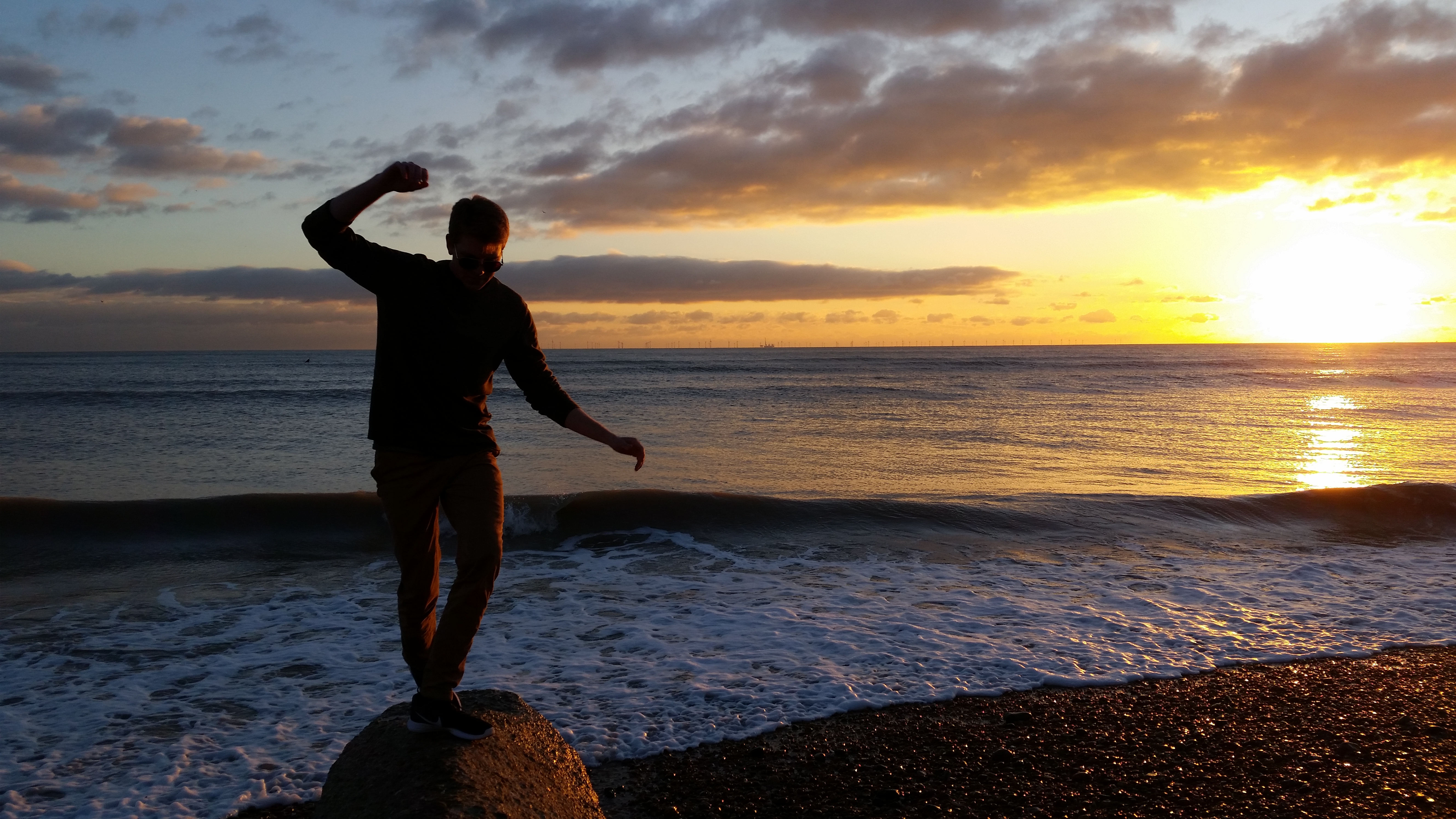
Balancing on Brighton Beach
My name is Sam Erickson and I am a physics major with minors in mathematics, history and anthropology. This is the first blog post of my semester studying abroad at the University of Sussex in Brighton, England. Brighton is about an hour and a half south of London on the English Channel. I chose to study at this university largely due to the prestige of its astrophysics and history programs.
Academically, Sussex is quite different from the University of Arkansas. I am taking four “modules:” “North Africa and the Middle East Since 1908,” “Religion and Ritual,” “20th Century History of Britain” and “Astrophysics.” Each class meets twice a week with the exception of physics, which meets three times a week. The other three classes have one lecture and one seminar per week. While the lectures are nearly identical to those in America, the seminars are smaller, group-based meetings where the students discuss texts excerpts and concepts from the lectures.
Unlike most universities in the United States, a full load of classes over here is between eight and twelve hours a week. I am in the classroom nine hours each week. Additionally, semesters are twelve weeks long. To compensate for less time in class, students are expected to devote more time outside of class to studying and reading texts (this is called “revising” in England). I find this system very comparable to that of American universities. Certainly, the extra reading in the humanities classes can be beneficial, but there is something to be said about spending more time with a good teacher. Overall, I am happy with all my professors and modules.
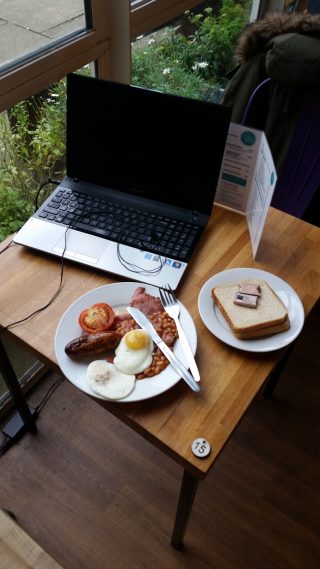
A traditional English breakfast
I am lucky enough to be on this exchange with my girlfriend, Rachel Schaffhauser. We flew from Little Rock to Chicago, then Chicago to London Heathrow. This was my first time flying in a commercial airplane and my first time leaving the country. Of course, the plane to Chicago was delayed, so we jogged across O’Hare to catch our flight with minutes to spare. Other than that, the flights were uneventful. No motion sickness, no problems. We landed around 11:00 am and made our way to the Airbnb in London I organized before we left. The host wasn’t at the apartment, so we spent several hours trying to contact her. This was a bit of a nightmare, as our phones couldn’t make calls, but we eventually used a stranger’s phone and were able to get into a different apartment.
Our London adventures were underway. We spent the next three days experiencing some of the best sites London had to offer. The British Museum, Westminster Abbey, St. Paul’s Cathedral and the Tower of London were some of my favorites. We had fish and chips, pints in the pub and walked many miles. After a few hectic, stressful, fun days we took the train from Victoria Station to Hove station and walked one mile to our student housing.
We arrived for the beginning of “Freshers’ Week.” This week of partying and orientation events is customary across most European universities. Our experience was quite tame, as we opted out of the raves and partying. We had fun at the Brighton Pier, pizza party orientation dinner and other events. Transitioning into classes was no problem. My modules are well constructed and the professors are helpful and experienced.
This last month has been unique and unforgettable. Sussex offers trips for international students and we have gone somewhere almost every weekend. Some of these trips include Stonehenge and Bath, the Sussex countryside and Oxford. I look forward to exploring Cambridge and Dover castle, as well as school life here in Brighton.
The Little Things
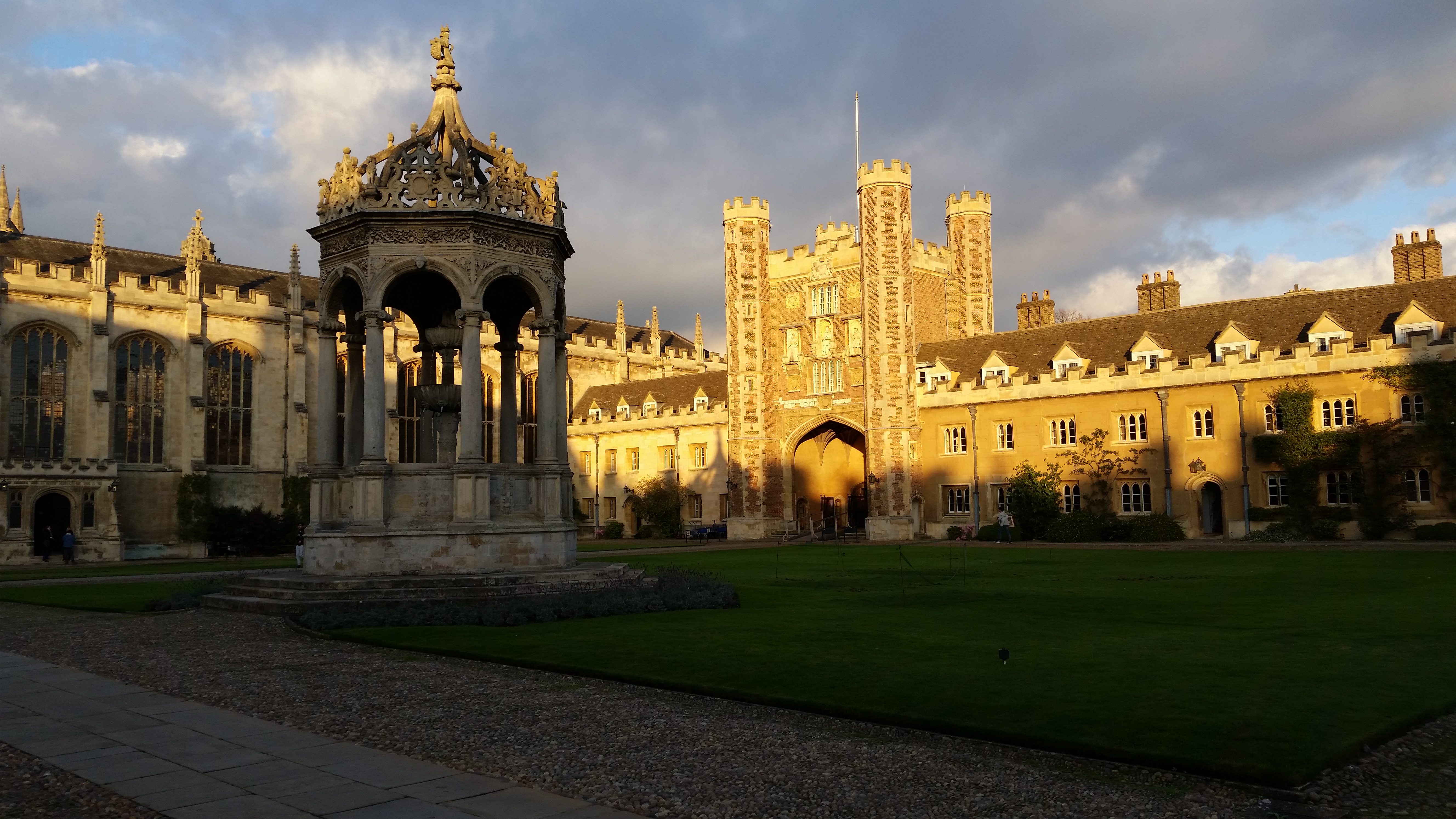
Trinity College, Cambridge
Hi! My name is Sam Erickson and I am a physics major with minors in mathematics, history and anthropology at the University of Arkansas. This is my second blog post covering my time at the University of Sussex in Brighton, England. Hopefully, this post will be more relaxed and interesting than my last, as I had to get through many logistical differences and dry details with the first post.
It is consistently ten to twenty degrees colder here than in Fayetteville. I checked Google Maps out of curiosity a few weeks ago to find that Brighton is about fourteen degrees farther north than Fayetteville and ninety-four degrees farther east. When I leave England on December sixteenth there will be less than eight hours of sunlight each day. I’m sure this all this geography seems random and probably nerdy, but it is something I’ve found myself thinking about a lot lately. I have crossed the Prime Meridian several times by bus and train since I arrived here. Unlike the equator, which is naturally defined as the great circle equidistant from each pole of the earth, the Prime Meridian was arbitrarily defined to go through the Royal Observatory in Greenwich, England during the nineteenth century. There is a complicated story behind this that includes British merchant maps and the United States using the location of the Royal Observatory to create its system of world time zones. I’ll let you read up on all that fun stuff yourself.
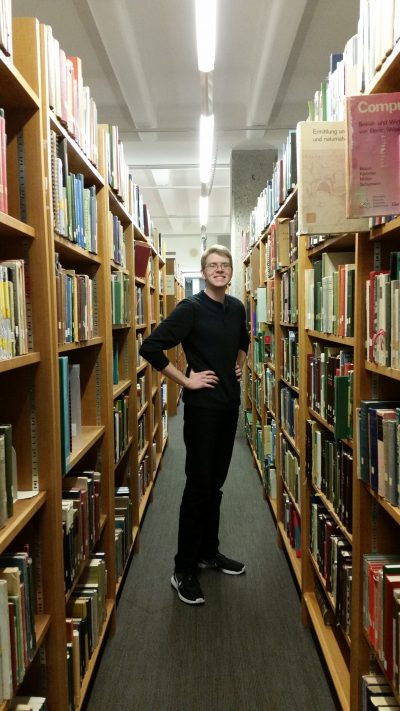
In the Sussex University Library
As far as differences compared to the United States are concerned, it’s the little things that count with England. Sure, they drive on the “wrong” side of the road, but I find cultural and linguistic aspects more interesting. The stove is the “hob,” studying is “revising,” people say “cheers” instead of “thank you” in almost every situation, the list goes on. Also, they have a coin worth two pence. This seems incredibly useless to me, considering they also have one, five, ten, twenty and fifty pence coins, as well as coins worth one and two pounds. The pound coins are bimetallic and really cool-looking.
My girlfriend and I were fortunate enough to be accepted into this exchange program. We have taken several trips offered by Sussex University to the international students, as well as a few trips on our own. We’ve gone from Stonehenge and Bath to London and Oxford. As a physics major, I especially loved seeing Trinity College at Cambridge University. Some of the greatest minds in all of science were students and/or instructors here, including Isaac Newton, Niels Bohr, James Clerk Maxwell and Stephen Hawking.
Of all my classes, I’ve found “North Africa and the Middle East Since 1908” to be the most interesting overall. Like many people in the class, I chose to take it because I didn’t really know anything about the subject going into it. My professors for this class are excellent at conveying grand, overarching historical ideas that tie together the nitty-gritty narratives we study in the texts we read. I’ll be back in America in less than a month, but I have plenty to do before then. The only grade taken in three of my four classes comes from a research paper as a final exam. Two of these are due before I leave, the final is due in mid-January (when all the regular students take their final exams for the fall semester). The only place I want to go before we leave is Dover Castle. It is the largest and one of the most historically significant castles in England, and it’s only a few hours’ journey by train.
First Things Last
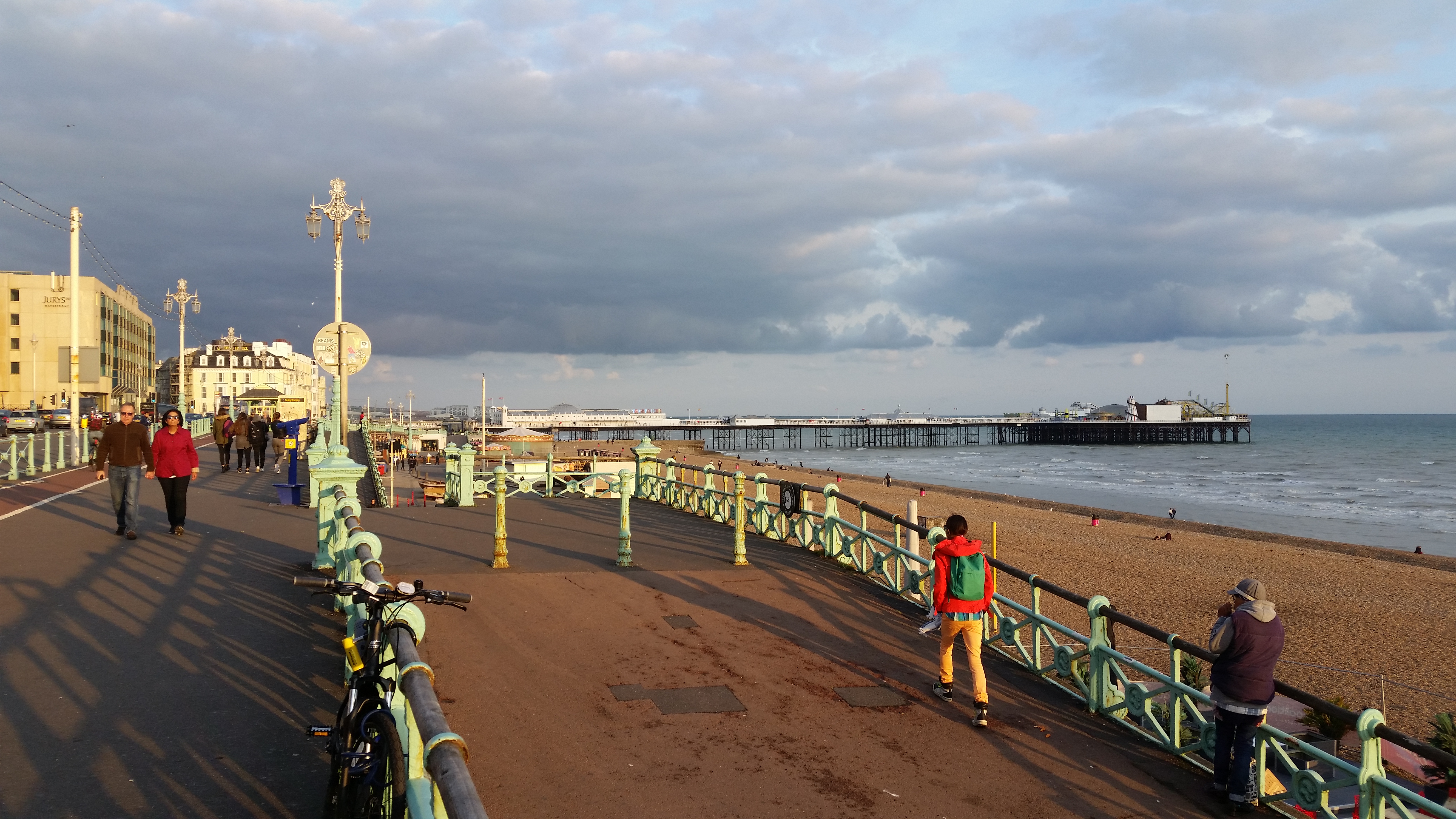
Hi! My name is Sam Erickson and I am a physics major with minors in mathematics, history and anthropology at the University of Arkansas. This is my third and final blog post covering my time at the University of Sussex in Brighton, England.
After more than three months in England, it’s good to be home. On December 16th I flew one quarter of the way around the world. As I crossed through six time zones, it was literally the longest day of my life. Heathrow to Houston to XNA, I was awake for about 27 hours straight. During my time in Brighton I learned more inside and outside the classroom than I could have anticipated. I made friends from all over the world and discovered a new nation, one of great history and culture.
As a student of history, I think of the castle as perhaps the greatest symbol of England. I was fortunate enough to visit a few castles during my stay. Each one had a completely different feeling and character. The first castle I ever visited was the Tower of London. While I could appreciate the political and historical importance of the castle, it was in the heart of London. Surrounded by skyscrapers and modern infrastructure, it seemed very much out of place. Also, considering that many of the buildings had been refaced and reconstructed in the 1850s, the castle felt insincere. It was a tourist attraction, not a mighty fortress.
About a month later, I visited Pevensey Castle in Sussex. While this castle was much smaller and less significant historically, it was a dream. The only ruined castle I have seen, it evoked a profound understanding of time and scale. A Norman castle surrounded by a much older Roman curtain wall, the scene was reminiscent of something out of Tolkien.
Finally, about two weeks before I came home, I took a three-hour train ride down the coast to see Dover Castle. This was the only fortress in England I researched before leaving America. Standing high atop the chalk Cliffs of Dover, this is the largest and one of the oldest castles in England. Defending the closest point in England to France, this castle has been expanded for nearly a thousand years. For me, this was the perfect example of the power of the British Empire. From William the Conqueror to Operation Dynamo in World War II, this castle has remained strong.
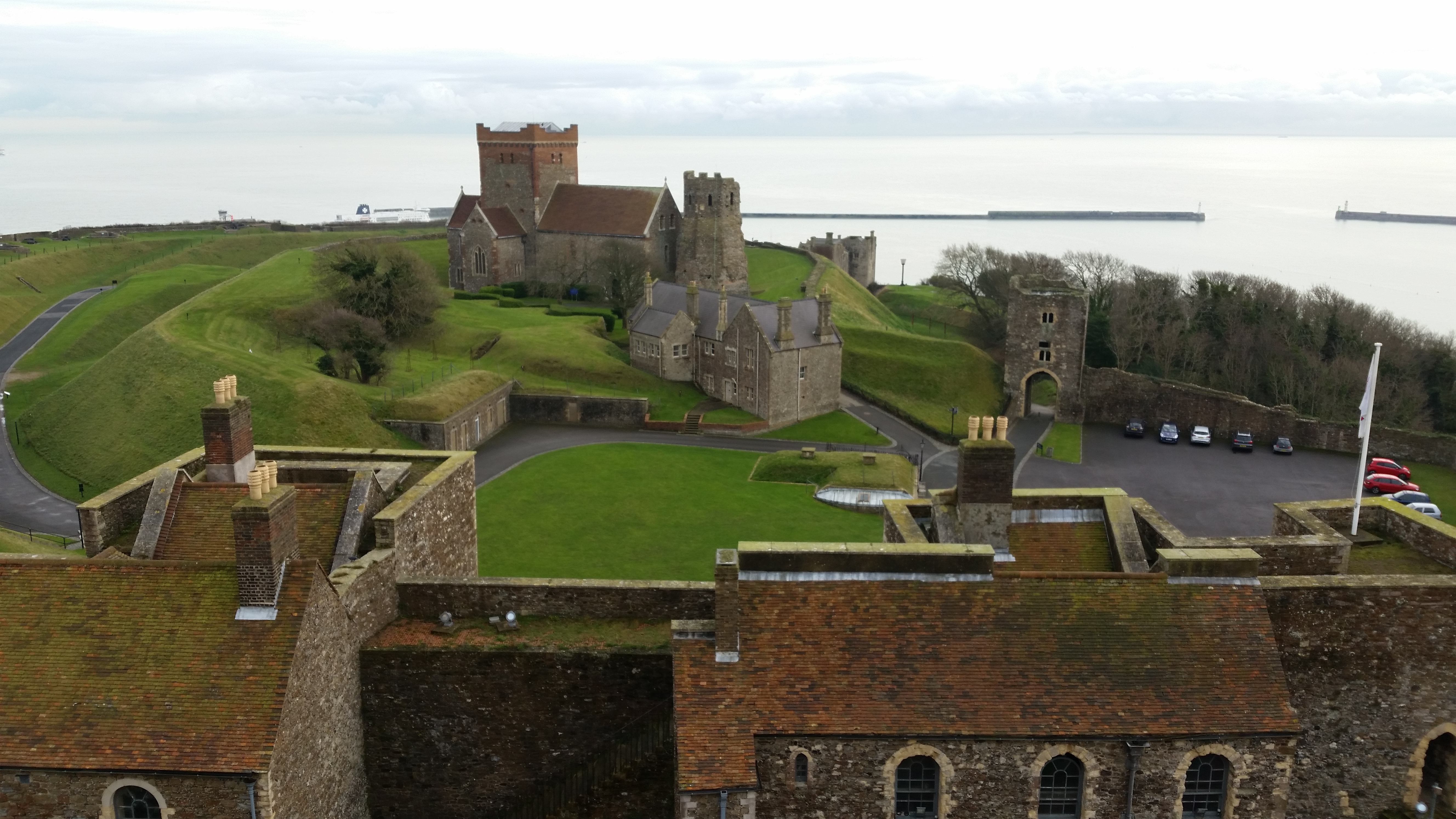
The view from atop Dover Castle
This trip will remain so memorable for me because it was one of firsts. First time leaving the country, first time flying in an airplane, first time living in a wholly new place by myself, and so many others. What is more, my girlfriend was able to experience all of this with me. We were both accepted to this study abroad program and had the trip of a lifetime. I feel I have learned so much. I expected to learn from my classes, but I didn’t imagine that I would learn even more from my experiences. Outside of the classroom, I learned skills involving travel, communication, working with people and doing all these things with confidence. If not for this trip, I may have never found the impetus to travel abroad. Now, I know that this is something I want to do. Not to see the world, but to better understand and appreciate it.
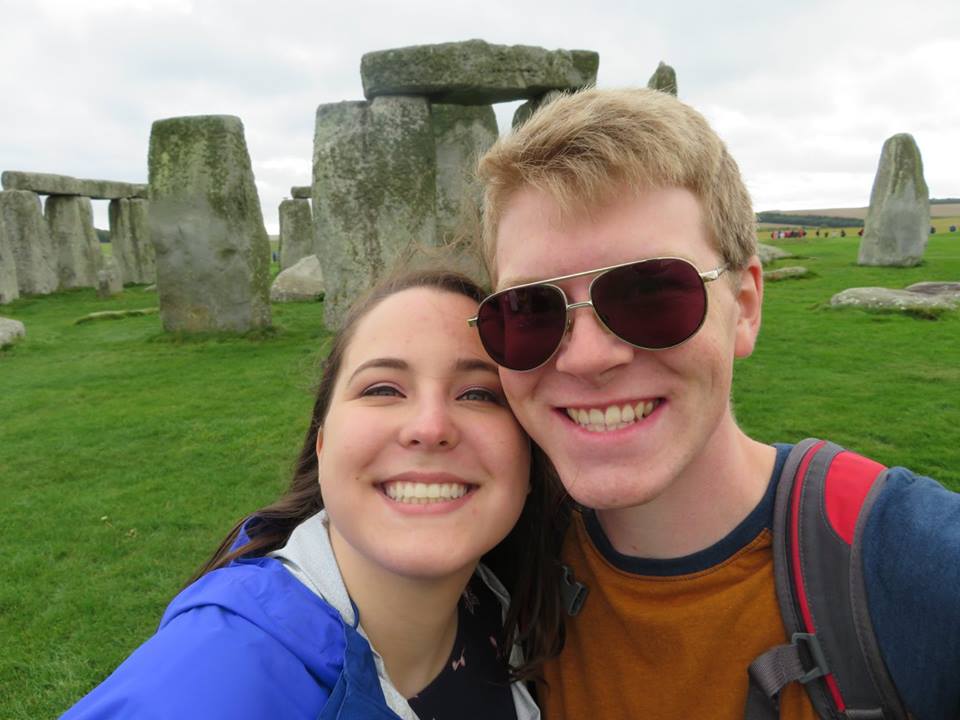
Visiting Stonehenge on a weekend trip







